Advertisement
Drinking Alcohol Makes It Easier To Fall Asleep: True Or False?


Plenty of people reach for a drink to help them unwind from the day and doze off, yet we're often told that alcohol inhibits sleep. So what gives? Drinking is something we do to relax, but does it actually have the opposite effect? Here, a sleep specialist breaks down the good, the bad, and the ugly of how alcohol affects our ability to rest.
Why alcohol may help people fall asleep faster.
"A lot of people think that alcohol helps them sleep, and in fact, it does help us fall asleep faster," Nishi Bhopal, M.D., a psychiatrist specializing in sleep medicine, explains to mbg. While booze will affect everyone differently, Bhopal says it typically reduces our sleep latency—the time it takes for us to fall asleep. (Sometimes dramatically, which is why it may feel like you fall asleep as soon as your head hits the pillow after a night out.)
This is because while alcohol has stimulant effects, it also has sedative qualities. Researchers still have questions about how exactly alcohol interacts with our brains and central nervous systems, but Bhopal explains that it seems to affect two key neurotransmitters: gamma-aminobutyric acid (GABA) and glutamate.
GABA is an inhibitory amino acid neurotransmitter, meaning it helps us relax and calm down.* Its counterpart, glutamate, does the opposite. It's an excitatory neurotransmitter that's active during the day. In a healthy system, GABA and glutamate are constantly balancing each other out.
And at first, alcohol activates GABA1, leaving us with that chill, calm sensation that can make falling asleep feel easier.
How it affects sleep as a whole.
While alcohol may help us doze off faster, its benefits end there. Bhopal explains that over time, as the calming effects of GABA wear off, we typically experience an upsurge in glutamate, which can make us feel awake and alert. If you're drinking before bed, this often happens exactly when you don't want it to: In the middle of the night.
"That initial sedative effect then wears off and what happens is you start waking up," Bhopal says. "It also disrupts and suppresses REM sleep during the night, so overall it has a negative effect on sleep architecture and sleep quality." By jolting us out of those deep sleep stages like REM, alcohol robs us of some of the key benefits of sleep: memory consolidation, mental restoration, and emotional processing. This can leave us feeling groggy, emotional, and out of it when we wake up after a night of drinking—even after spending a lot of time asleep.
Wendy M. Troxel, Ph.D., a clinical psychologist and certified behavioral sleep medicine specialist, previously told mbg that since alcohol has diuretic properties, drinking it before bed can also make us need to get up to use the bathroom more—further disrupting sleep.
Research suggests that to give your body enough time to process alcohol, you should stop drinking four to six hours before bed. Bhopal notes that abstaining from drinking during this window is not realistic for many people, so her advice is to pay attention to how alcohol affects your personal sleep quality and energy levels.
If you do notice that you wake up feeling worse after having a glass of wine at night, experiment with occasionally swapping alcohol out for another nightly routine that will truly relax you—without any ensuing sleep disruption. Nighttime comforts like a good book, a soothing cup of tea, or a sleep-supporting supplement can all take its place as a relaxing treat.*
The bottom line.
While drinking alcohol before bed might help you fall asleep faster, it will negatively affect your rest as the night goes on and potentially leave you feeling tired the next morning. Mocktail, anyone?
